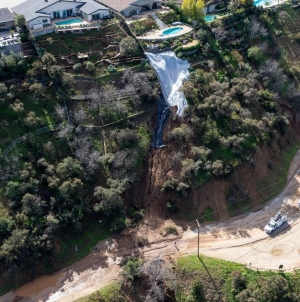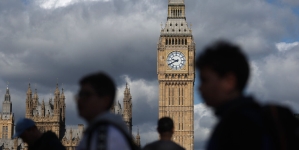-
Opinion | What Happens When Palestinians Tell Their Stories Directly to the World? - November 12, 2023
-
A portion of Mulholland Drive, damaged by mudslides in winter storms, reopens - May 26, 2024
-
‘Maybe You Don’t Want to Win’ - May 26, 2024
-
Donald Trump Putting Law Enforcement in Danger: Attorney - May 25, 2024
-
Avoid the waters of these 5 L.A. County beaches this holiday weekend, public health officials say - May 25, 2024
-
Bawdy Comedy ‘Anora’ Wins Palme d’Or at Cannes Film Festival - May 25, 2024
-
Map Shows Heat Wave Zone Spread Into Five New States - May 25, 2024
-
Azusa police arrest suspected slingshot-wielding vandal - May 25, 2024
-
Donald Trump Hammers Judge Ahead of Jury Instructions - May 25, 2024
-
Sometimes U.S. and U.K. Politics Seem in Lock Step. Not This Year. - May 25, 2024
Opinion | What Happens When Palestinians Tell Their Stories Directly to the World?
After the Israeli military killed his older brother in an airstrike in Gaza in 2014, Ahmed Alnaouq says, he almost lost his will to live. “I sank into a deep depression,” he told me in a recent phone call. But an American friend convinced him to write about his brother and channel his grief into something productive. Together, they founded We Are Not Numbers, a project that trains young writers in Gaza and publishes their personal essays in English.
The name is a nod to how numbing numbers can be. The higher the death toll, the less we are inclined to care, since the scale of human suffering can feel overwhelming. Statistics don’t trigger empathy and action. Personal stories do.
“This project changed my life because for the first time, I thought that some people can care about us,” Mr. Alnaouq said, describing the response it got outside Gaza.
We Are Not Numbers began as a way to memorialize the dead, but it quickly turned into a lifeline for the living. For young people in Gaza, stuck in a political system with few rights and a blockaded economy with few jobs, it provides a vital outlet for self-expression. More than 350 people have participated since it began. They have written about falling in love in a time of war (“I’m afraid of being the next dead bride”), about sculpture (“turning bullets into art”) and money (“The life cycle of the Palestinian graduate”). They have contributed pieces about longing to leave Gaza and longing to return.
The project’s mission is to give Palestinians a chance to tell their own stories without relying on Western gatekeepers or foreign intermediaries. Although the project pairs aspiring journalists and activists with mentors in the United States and Europe who give them advice on their writing, the point is to allow Palestinians to decide what stories are told, according to Pam Bailey, who co-founded the project with Mr. Alnaouq.
It is part of a broader trend of Palestinians speaking directly to the world, enabled by the rise of social media and technologies like Google Translate. It is perhaps why Gallup polls show sympathy for Palestinians rising since 2018, particularly among millennials and Democrats.
It used to be difficult in the United States to hear a Palestinian perspective on the conflict. While Israelis have an embassy in Washington and a host of well-known groups dedicated to communicating with the American public — and scrutinizing what journalists write — Palestinians have not had the same public relations capacity. Now that hole is being filled by wrenching social media posts from ordinary people whose family members have just been killed by the Israeli military.
Many Israelis and American Jews are outraged by the vocal criticisms of Israel on display at protest marches in recent weeks, which feel particularly painful in the wake of the devastating Oct. 7 Hamas attacks on Israeli civilians. At times, pro-Palestinian protesters have veered into blatant antisemitism or worse. Indeed some critics have called We Are Not Numbers an anti-Israeli organization. But the number of outlets that have been accused of bias in recent weeks has also diluted the impact of such criticism.
Mr. Alnaouq received permission to leave Gaza in 2019 to attend journalism school in Britain. He lives in London now and helps manage the project from afar. He told me he “wholeheartedly believes in peace and is very, very anti-violence”— a worldview he said he developed as a journalist and human rights defender. He said he rejects the killing of any civilians, including the Oct. 7 attacks. He also insisted that peaceful coexistence can be achieved only once Israelis understand the injustice that Palestinians endure and address it.
A few years ago, that looked as though it might happen when Jewish people began translating We Are Not Numbers essays into Hebrew and posting them on Facebook. Hopeful that change was possible, Mr. Alnaouq started a new project with an Israeli journalist called Across the Wall, which produced stories from Gaza for an Israeli audience.
But since Oct. 7, hope has been swamped by unbearable violence. We Are Not Numbers is now full of writing about what it is like to know that you can die at any moment and of tributes to writers who have been killed: Huda al-Sosi, a young woman who last year wrote an article about the art of quilling, was killed in an Israeli airstrike on Oct. 23, according to the site. Yousef Maher Dawas, who wrote about the destruction of his family’s fruit orchard, was killed on Oct. 14. Mahmoud Alnaouq — Mr. Alnaouq’s younger brother — who interviewed Gazans about their views of U.S. sanctions on Venezuela, was killed on Oct. 20 when a bomb flattened their father’s house, killing 21 members of their family, including a niece who died of her injuries later.
“What could make me forgive?” Mr. Alnaouq asked on a Facebook post about their deaths. “And how will I forgive myself for not being with them on such days?”
Yet, even in his grief, he stands by the power of stories.
He told me his sister Walaa, an engineer who he said was the smartest person he’d ever met, had finally gotten a job after years of trying. His brother Mahmoud had been preparing to leave for Australia to study political science. His father, Nasri Alnaouq, spent decades building the skyline of Tel Aviv.
“After losing my family, I did not stop believing in what I believe in,” he told me. “I don’t want other people to feel what I am feeling. Not the Israelis, not the Palestinians.”
He said a local news agency in Gaza reported that a house in his hometown Deir al-Balah had been bombed and “a number” of people killed, but it did not say who. Their names were:
Nasri Alnaouq, age 75
Walaa Alazayizi, age 36
Raghd Alazayizi, age 13
Eslam Alazayizi, age 12
Sara Alazayizi, age 9
Abdullah Alazayizi, age 6
Muhammad Alnaouq, age 35
Bakr Alnaouq, age 11
Basema Alnaouq, age 9
Alaa Salman, age 35
Eslam Salman, age 13
Dima Salman, age 12
Tala Salman, age 8
Noor Salman, age 4
Nasmah Salman, age 2
Aya Bashir, age 33
Malak Bashir, age 12
Mohammed Bashir, age 9
Tamim Bashir, age 6
Mahmoud Alnaouq, age 25
Ali Alqirinawi, age 33
































